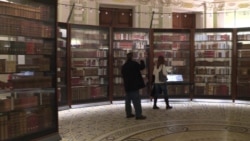Two hundred years after the U.S. Congress purchased a huge collection of books belonging to former President Thomas Jefferson, it remains one of America’s greatest literary treasures and has become the centerpiece of Washington’s Library of Congress. The collection is on permanent display in wood and glass cases at the world’s largest library that is open to the public.
Jefferson spent 50 years accumulating the largest private collection in the United States — 6,487 volumes. Many of the writings influenced Jefferson, who was president from 1801 to 1809 and crafted many of the American ideals of democracy that hold true today.
The collection changed the concept of what American’s premier library would become, said Mark Dimunation, chief of rare books and special collections at the Library of Congress.
“It completely altered the notion of what was appropriate for that collection — from needlepoint designs to architecture," he said. Before that, Dimunation added, “it was a working library that members of Congress would need — law, trade, dictionaries, some classical history.”
Variety of subjects
Jefferson’s passion for books and learning is evident in the wide variety of books that came from the president’s plantation home, Monticello, in Virginia.
“He liked books about clever invention. He liked code breaking," Dimunation said. "He had a good deal of interest in aspects on farming, massive holdings on law and his great love, architecture.”
The Library of Congress' first home was in the U.S. Capitol, where it was placed in 1801. In 1814, during the War of 1812 between Britain and the United States, British soldiers burned the Capitol building, destroying many of the library’s 3,000 books. A month later, Jefferson offered his personal library as a replacement and sold it to Congress.
Marcelo Alvez, an engineer and college professor from Brazil, visited the library and was impressed with Jefferson’s collection.
"It's quite surprising to see a leader, a president that is interested in philosophy, mathematics, physics, agriculture,” he said. “He was a man of huge knowledge that we won’t find today.”
Jefferson was born into a prominent family and had the means to acquire books, which were expensive. Many came from Britain and from France, where he was an American envoy. “Most of the books about North America came from Europe,” Dimunation said, and enabled Jefferson to build the “greatest collection on North America in his lifetime.”
While studying law as a young adult, Jefferson obtained an English version of Islam's holy book, the Quran.
“Jefferson, we think, acquired it at the time because the teaching was that the Quran was Arabic law," Dimunation explained. “This would cover his understanding of international law on the part of Muslim countries.”
Guidebook to Constitution
Jefferson, who was the author of the U.S. Declaration of Independence, read influential books on politics during his time. This included “The Federalist,” a collection of articles and essays promoting the ratification of the U.S. Constitution.
“It is a guidebook to understanding not only the American Constitution," Dimunation said, “but has been employed ever since as a guide toward the creation of constitutions worldwide.”
In 1851, another fire in the Capitol destroyed many books in the library and more than half of Jefferson’s collection. After that, the permanent structure, now known as the Thomas Jeffferson building, was constructed to house the congressional library.
In the exhibit, many of Jefferson’s books are marked with ribbons — green for original books and gold for replacements from sources outside the library. Books with no ribbons are duplicates that were already in the Library of Congress collection. Some books are still being sought.
“Out of the 4,000 or so that I needed to replace to reconstruct Jefferson's library before the 1851 fire, I am down to less than 250 books to go,” Dimunation said.
Jefferson donated his beloved books after he had retired from public life and never saw them again. But in the spirit of America's third president, who wanted to share his collection, researchers may use his books in the library’s reading rooms.





